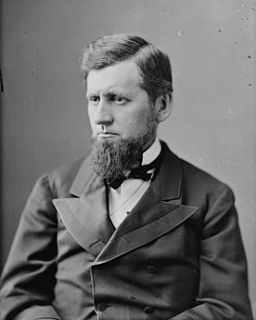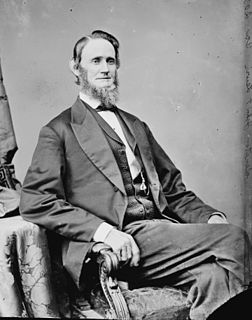
Elections to the United States House of Representatives were held in 1868 to elect Representatives to the 41st United States Congress. The election coincided with the presidential election of 1868, which was won by Ulysses S. Grant.

Although the 17th Amendment was not passed until 1913, some states elected their Senators directly before its passage. Oregon pioneered direct election and experimented with different measures over several years until it succeeded in 1907. Soon after, Nebraska followed suit and laid the foundation for other states to adopt measures reflecting the people's will. By 1912, as many as 29 states elected senators either as nominees of their party's primary or in conjunction with a general election.
The United States Senate elections of 1894 and 1895 were a slight Republican victory. It was a different story in the House where Democrats suffered massive losses. The senators elected went on to serve in the 54th Congress.
The United States Senate elections of 1852 and 1853 were elections which had the Democratic Party gain two seats in the United States Senate, and which coincided with the 1852 presidential election. Only six of the twenty Senators up for election were re-elected.

The United States Senate elections of 1858 and 1859 were elections which had the Republican Party gain five additional seats in the United States Senate, but the Democrats retained their majority. That majority would erode in 1860 with the secession of the southern states leading up to the Civil War. In Illinois, incumbent Stephen A. Douglas (D) and challenger Abraham Lincoln (R) held a series of seven debates, known as the "Lincoln–Douglas debates."
The United States Senate elections of 1872 and 1873 were elections which had the Republican Party, while still retaining a commanding majority, lose two seats in the United States Senate. By the beginning of the Congress, however, they'd lost three more: two as defections to the Liberal Republican Party, and one a resignation of Henry Wilson to become U.S. Vice President. These elections also coincided with President Ulysses S. Grant's easy re-election.
The United States Senate elections of 1868 and 1869 were elections which had the Republican Party maintain their majority in the United States Senate. However, six former Confederate states were also readmitted separately from the general election, each electing two Republicans. This increased the Republicans' already overwhelming majority to the largest number of seats ever controlled by the party.

The United States Senate elections of 1898 and 1899 were landslide elections which had the Republican Party gain six seats in the United States Senate.

The United States Senate elections of 1902 and 1903 were elections which had the Democratic Party gain three seats in the United States Senate, but the Republicans kept their strong majority.
The United States Senate elections of 1884 and 1885 were elections that coincided with the presidential election of 1884. Both Republicans and Democrats lost seats in the United States Senate due to the failure of three state legislatures to finish elections in time. Republicans, nevertheless, retained majority control and the Readjusters joined their caucus. By the beginning of the first session, in December 1885, Republicans had won all three vacant seats, increasing their majority.
The United States Senate elections of 1886 and 1887 were elections that had the Republican Party lose two seats in the United States Senate. At the beginning of the 50th Congress, therefore, Republicans had the slimmest possible majority due to a vacant Democratic seat: 38 out of 75 seats. Once that vacancy was filled, Republicans maintained control as the single Readjuster Senator caucused with them.
The United States Senate elections of 1890 and 1891 were elections in which the Republican Party lost four seats in the United States Senate, though still retaining a slim majority. That majority was increased, however, upon the admission of two more states with Republican senators.

The United States Senate elections of 1906 and 1907 were elections which had the Republican Party gain three seats in the United States Senate, expanding their majority to more twice that of the opposing Democratic Party.
The United States Senate elections of 1820 and 1821 were elections for the United States Senate that, corresponding with James Monroe's landslide re-election, had the Democratic-Republican Party gain seven seats, assuming almost complete control of the Senate.
The United States Senate elections of 1866 and 1867 were elections that saw the Republican Party gain two seats in the United States Senate as several of the Southern States were readmitted during Reconstruction, enlarging their majority.
The United States Senate elections of 1864 and 1865 were elections corresponding with Abraham Lincoln's re-election, with the Republican Party gaining two seats in the United States Senate. As these elections occurred during the Civil War, most of the Southern States were absent.
The United States Senate elections of 1860 and 1861 were elections corresponding with Abraham Lincoln's election to the presidency. The nascent Republican Party increased their Senate seats in the general elections, and after southern Democrats withdrew to join the Confederacy, Republicans gained control of the United States Senate. To establish a quorum with fewer members, a lower total seat number was taken into account.
The United States Senate elections of 1862 and 1863 were elections during the American Civil War in which Republicans increased their control of the U.S. Senate. The Republican Party gained three seats, bringing their majority to 66% of the body. Also caucusing with them were Unionists and Unconditional Unionists. As many Southern states seceded in 1860 and 1861, and members left the Senate to join the Confederacy, or were expelled for supporting the rebellion, seats were declared vacant. To establish a quorum with fewer members, a lower total seat number was taken into account.











